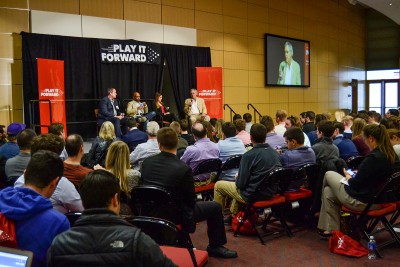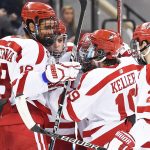
A star-studded panel capped off Friday’s Play It Forward summit at Agganis Arena and shed light on how athletes, coaches and teams are covered in the media.
Moderated by Bill Littlefield, the host of NPR’s “Only A Game,” Don Van Natta Jr., a Pulitzer Prize-winning writer for ESPN The Magazine; Kevin Blackistone, a panelist on ESPN’s “Around the Horn”; and Katie Nolan, the host of Fox Sports 1’s “Garbage Time with Katie Nolan,” shared their thoughts with a crowd of roughly 200.
With backgrounds in column writing, investigative journalism and broadcast journalism, the panelists began by addressing the evolution of The Players Tribune. Founded by former New York Yankees shortstop Derek Jeter, the site serves as an outlet for players to share their own stories without having to use reporters as a middleman.
“A lot of players are now behind the lens of the Player Tribune and that’s their … unfiltered lens out to the public,” Blackistone said. “Certainly, there’s been some news broken on The Players Tribune, and those of us on the media still interpret that news for the rest of the public.”
Blackistone said players now don’t have to entrust their story in a reporter, even if they’re around the team on a day-to-day basis. Most notably, Kobe Bryant, a five-time NBA champion with the Los Angeles Lakers, broke the news of his retirement on the site.
Nolan, who previously worked on Fox Sport 1’s now-defunct show “The Crowd Goes Wild,” had a harsher viewpoint on The Players Tribune, although she admitted that she doesn’t discover stories herself.
“Players Tribune feels so much like a [public relations] machine in that the point of journalism and why what you guys and others do is so important is they research it and crosscheck and talk to other people,” Nolan said. “… It feels so much like a press release and not a writer.”
Littlefield quickly guided the panelists into the subject of women in sports media, a theme that surfaced throughout the summit’s five different events.
“We aren’t quite in the same in place that we used to be,” he said. “We got a woman coaching in the NBA. We’ve got women doing Xs and Os. We’ve got women doing play-by-play.”
While some progress has been made in support of women in sports journalism, Blackistone noted the current issues that women in the field still face.
“Women in television news have been, particularly in sports journalism, … objectified and sexualized,” Blackistone said. “[It’s] almost as if they’re being valued for their appearance than for what’s between their ears. I think that’s troubling.”
Nolan said not much progress has been made, and he added that television viewers often prefer male talking heads on the screen. As a result, men often get jobs instead of more competent female colleagues.
“The majority of the audience in sports, the vocal majority, is male,” Nolan said. “Especially in what I do, which is give my opinion and talk about what think and how I feel, there’s an overwhelming Internet reaction of, ‘Please stop doing that. Shut up.’ … It’s not a lovely, welcoming place.”
Van Natta Jr. agreed with Nolan’s statement, noting that criticism often dominates comment sections and Twitter feeds.
“It’s going to be a long, slow slog, I think, to be really realistic and honest about it,” Van Natta Jr. said. “I’m talking decades before we ever see a level playing field between male and female athletes.”
The final topic panelists addressed was the journalistic question of whether speed or accuracy is more important. Blackistone said there’s often a tantalizing temptation to publish just because a topic is trending on social media, and that desire is amplified by the ability to delete information so easily in digital space.
Van Natta Jr., who most recently wrote a longform piece on the NFL moving the Rams from St. Louis to Los Angeles, said it’s a perilous path to walk down. He’ll often spend months on a story and speak with extra sources, all to deliver the most accurate story possible.
“There is pressure to break news always, 24/7,” Van Natta Jr. said. “But there’s also pressure to get it right, and that’s always the dilemma.”
The seminar concluded with panelists offering advice that ranged from developing a passion for writing to getting as much experience as possible.
These words were well received by many. Karishma Desai, a first-year graduate student in the College of Communication, said she didn’t know what to expect before coming to the session but found it interesting.
“I didn’t know if it was going to be super sports heavy,” she said, “but I liked how it was very interdisciplinary, and I liked that they incorporated technology and health because I’m also a science nerd.”
Miles Roberts, a 2010 College of Arts and Sciences graduate and the director of sports information at Wellesley College, said he was glad that the panel covered a wide range of sports journalism.
“I thought the panel was very well done, certainly with the scope of the journalists who were here from radio, television as well as new media,” he said. “So as a resource for current students and alums, it’s great to hear from them.”
Jonathan's a New Englander who writes about sports, features and politics. He currently covers men's hockey at BU, worked as Sports Editor during the spring 2016 semester and is on the FreeP's Board of Directors. Toss him a follow on Twitter at @jonathansigal.




